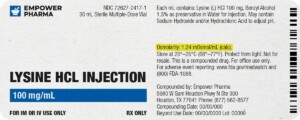The amounts of ZINC, COPPER, MANGANESE and SELENIUM in the solution are very small and toxicity symptoms due to these trace elements at suggested dosage levels are considered unlikely to occur.
Overdosage: Symptoms of ZINC overdosage resulting from oral ingestion of Zinc Sulfate in large amounts have resulted in death. Symptoms included nausea, vomiting, dehydration, electrolyte imbalances, dizziness, abdominal pain, lethargy and incoordination. Single intravenous doses of 1 to 2mg zinc/kg bodyweight have been given to adult leukemic patients without toxic manifestations. Normal plasma levels for Zinc vary from approximately 88 to 112 mcg/100 mL. Plasma levels sufficient to produce symptoms of toxic manifestations are not known. Calcium supplements may confer a protective effect against Zinc toxicity.
Symptoms of COPPER toxicity reported in literature include prostration, behavior change, diarrhea, progressive marasmus, hypotonia, photophobia and peripheral edema. D-penicillamine has been reported effective as an antidote.
MANGANESE toxicity has not been reported in patients receiving TPN. Neither have reports of manganese toxicity from excessive intake in foods and/or beverages been published.
Chronic toxicity in humans resulting from exposure to SELENIUM in industrial environments, intake of foods grown in seleniferous soils, use of selenium contaminated water, and application of cosmetics containing selenium has been reported in literature. Toxicity symptoms include hair loss, weakened nails, dermatitis, dental defects, gastrointestinal disorders, nervousness, mental depression, metallic taste, vomiting, and garlic odor of breath and sweat. Acute poisoning due to ingestion of large amounts of selenium compounds has resulted in death with histopathological changes including fulminating peripheral vascular collapse, internal vascular congestion, diffusely hemorrhagic, congested and edematous lungs, brick-red color gastric mucosa. The death was preceded by coma. No effective antidote to selenium poisoning in humans is known. Animal studies have shown casein and linseed oil in feeds, reduced glutathione, arsenic, magnesium sulfate, and bromobenzene to afford limited protection.

 Magnesium Chloride Injection
Magnesium Chloride Injection Selenium Injection
Selenium Injection Zinc Sulfate Injection
Zinc Sulfate Injection Calcium Gluconate Injection
Calcium Gluconate Injection